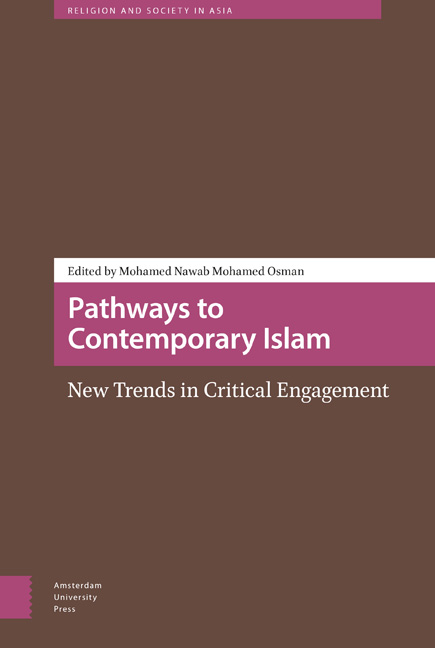Book contents
- Frontmatter
- Dedication
- Contents
- Acknowledgements
- Introduction: Constructing Pathways to Contemporary Islam
- Section 1 Historical Trends in Contemporary Perspective
- Section 2 Contesting the Islamic Intellectual Tradition
- Section 3 Beyond the Arab Revolutions: Political Islam Revised
- Section 4 Contemporary Spaces of Critical Engagement
- Notes on the Contributors
- Index
5 - The Function of Myths in the Justification of Muslim Extremism
Published online by Cambridge University Press: 25 November 2020
- Frontmatter
- Dedication
- Contents
- Acknowledgements
- Introduction: Constructing Pathways to Contemporary Islam
- Section 1 Historical Trends in Contemporary Perspective
- Section 2 Contesting the Islamic Intellectual Tradition
- Section 3 Beyond the Arab Revolutions: Political Islam Revised
- Section 4 Contemporary Spaces of Critical Engagement
- Notes on the Contributors
- Index
Summary
Abstract
This chapter argues that the prevalence of certain myths in Islamic tradition predispose some Muslims into adopting exclusivist ideas that define their religious orientations in a manner that can be viewed sociologically and even theologically as extremist. By taking the examples of the alleged genocide of the Bani Qurayza Jewish tribe by Prophet Muhammad and the alleged link between a Yemeni Jew to the founding of Shiite Islam, the chapter shows that these myths have led to justification of anti-Semitism, violence against non-Muslims, and sectarianism in the Muslim World. The chapter concludes by calling for a more critical reading of Islamic tradition.
Keywords: Muslim extremism; myths in Islam; Islamic tradition
Introduction
It is known that the phenomenon of religious extremism has a myriad of causes, among them being psychological and social factors. Psychological factors may include low self-esteem and a sense of humiliation, while social factors may include a lack of social integration or the dominance of exclusivist orientations. Without downplaying the complexity of the phenomenon of religious extremism and the salience of the various psychological and sociological factors that have been cited by researchers in the field, this chapter focuses on a specific social cause. This has to do with the role of myths in the justification of an extremist orientation among believers. I argue that the prevalence of certain myths in Islamic tradition predispose Muslims into adopting exclusivist ideas that define their religious orientations in a manner that can be viewed sociologically and even theologically as extremist.
This chapter proceeds as follows. In the next section I briefly discuss the meaning of myths as used in this study. Myths can be seen as ideas that function within an ideological or utopian orientation to preserve or advance the interests of a particular group. This is followed by an account of one particular myth that has an important place in Islamic tradition. This is the story of the killing of the men of the Medinan Jewish tribe, the Banu Qurayza. I suggest that this story is indeed a myth that functions to maintain a certain attitude of Muslims towards Jews. This attitude can be defined as extremist to the extent that it is an exclusivist one.
- Type
- Chapter
- Information
- Pathways to Contemporary IslamNew Trends in Critical Engagement, pp. 125 - 142Publisher: Amsterdam University PressPrint publication year: 2020



